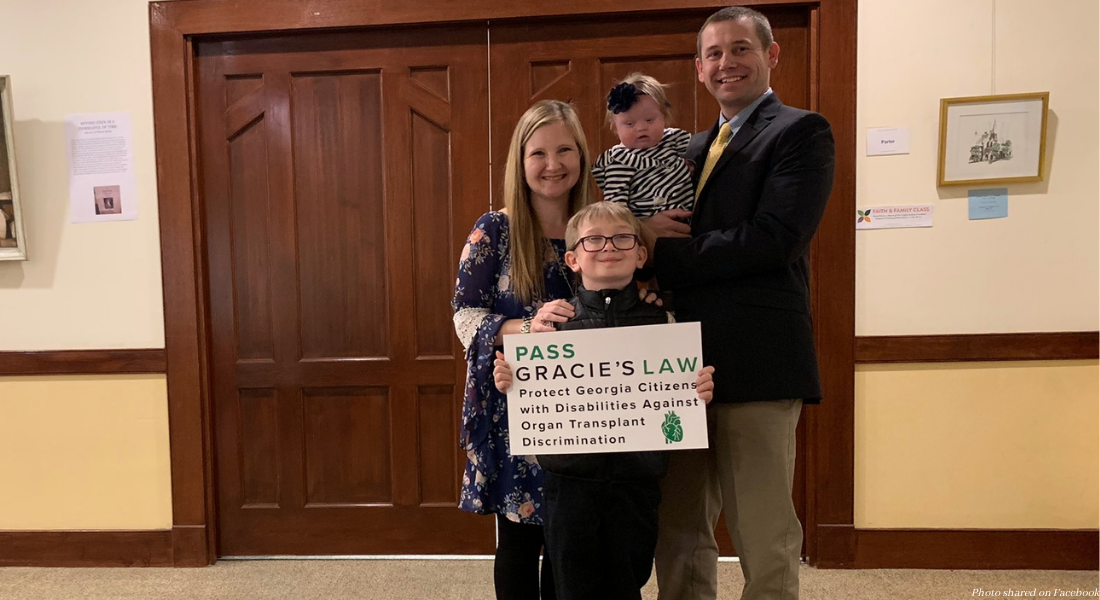A Georgia family is fighting to end organ transplant discrimination after realizing how close their daughter could have come to dying. David and Erin Nobles are the proud parents of little Gracie Joy, who has Down syndrome. When they learned it is legal for people with disabilities to be denied organ transplants, they decided to take action with Gracie’s Law.
When Gracie was a baby, she ended up needing heart surgery. “She started going into congestive heart failure,” David Nobles told WTOC. We went back to the hospital and spent another month or two in the NICU.” That turn of events made them realize that they could easily have lost their daughter, had she ended up needing a heart transplant. “If Gracie would’ve needed a heart during all of this, there might have been obstacles that we face,” he said.
Many people believe that the Americans with Disabilities Act (ADA) prevents this kind of discrimination. But currently, there is no federal law prohibiting it, and according to the National Down Syndrome Society (NDSS), only a few states have passed laws to prohibit it. Even more worryingly, a 2008 study from the Autism Self-Advocacy Network found that 85% of pediatric transplant centers take neurodevelopmental status into consideration for approving or denying transplants.
The sad reality is that many transplant centers do take disability into consideration when approving or denying organ transplants. A 2016 letter sent to the U.S. Department of Health and Human Services’ Office for Civil Rights included a statement from Dr. Arthur Caplan, director of medical ethics for New York University’s Langone Medical Center. In the statement, Caplan said, “If the potential recipient is severely intellectually impaired… I do not think it makes sense to consider that child for a transplant.”
Often, the only recourse is to fight the discrimination with a lawsuit — but as Erin Nobles explained to WTOC, that’s not feasible for many in the disability community. “If you are fighting a case of discrimination the parents have to take this to federal court and there is the problem,” she said. “Because in federal court you may not get on the docket for six months to two or three years. Our community of people do not have time on our side to wait.”
READ: Culture of life: Community unites to support family expecting baby with disabilities
Michelle Pendergrass, also of Georgia, is a caregiver for her sister, who has Down syndrome. When her sister went into kidney failure, doctors refused to refer her for a transplant, and instead said she should go on dialysis. “I said, ‘Why? You haven’t done any tests yet,’” Pendergrass told WTOC. “There was no diagnostics, no medical evaluation; they hadn’t seen any of her files or paperwork from her other doctors, etc.”
Now, Pendergrass is working with the Nobles family and Georgia Representative Rick Williams to pass Gracie’s Law. So far, it passed unanimously through the House of Representatives, and Williams is confident it will make it through the state Senate as well. “I can promise you when this thing gets to the Senate floor there will be every senator signed on it too,” Williams said. “This little Gracie, she melts your heart.”
Under Gracie’s Law, if a family member alleges discrimination, they can take it to local courts, where their case must be heard within 30 days — not three years. “I had hoped that we had come far enough with disabled people and people with Down Syndrome that I wouldn’t have ever run into that,” Pendergrass said. “I was just amazed that I did.”
A similar bill is under consideration in the U.S. Congress which would make it illegal to use a patient’s disability as the sole basis of ineligibility to receive a transplant. Ashley Helsing, director of government relations at NDSS, said this kind of medical discrimination is due to lingering ableism and is not based in reality. “There have actually been studies done that show that people with disabilities actually do better after getting a transplant than people without,” Helsing told TODAY. “Again, it goes back to those preconceived notions and misconceptions that are rampant in society.”
Charlotte Woodward is a woman with Down syndrome who successfully received a heart transplant — and now she’s fighting for other people like her. “It boils down to a bias in the whole health care system,” she said to TODAY, “and sends a message to people with Down syndrome about whether they have worth and value and whose lives matter the most.”
“Like” Live Action News on Facebook for more pro-life news and commentary!







